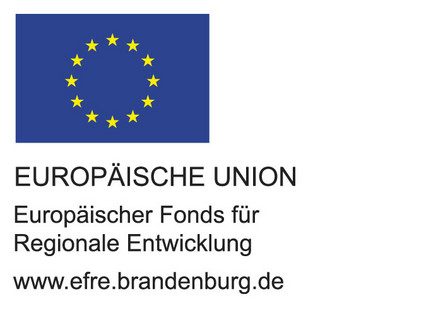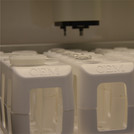Projects using HPLC-MS/MS (Infinity 1200, 6495, Agilent, Waldbronn, Deutschland)
Biomarkers of nutrition-related diseases
Basic research into nutrition-related diseases
- DNA (hydroxy)methylation: detection of epigenetic changes
- Gluthation and glutathione disulphides: markers of oxidative stress
- Isoprostanes: Marker of oxidative stress
- PARylation: Marker of DNA damage response
- Serotonin and dopamine: Measurement of neurotransmitters to detect neurotoxicity
- T3, T4: Establishment of a method to detect thyroid hormones
- 8-oxo-guanine: Marker of oxidative DNA damage in C. elegans
Publications, posters, presentations published within these projects with reference to ERDF funding
Paper
C. Neumann, J. Baesler, G. Steffen, M. M. Nicolai, T. Zubel, M. Aschner, A. Bürkle, A. Mangerich, T. Schwerdtle, J. Bornhorst, The role of poly(ADP-ribose) polymerases in manganese exposed Caenorhabditis elegans. J Trace Elem Med Biol 2020, 57:21-27
K. Nowotny, J. P. Castro, M. Hugo, S. Braune, D. Weber, M. Pignitter, V. Somoza, J. Bornhorst, T. Schwerdtle, T. Grune, Oxidants produced by methylglyoxal-modified collagen trigger ER stress and apoptosis in skin fibroblasts, Free radical biology & medicine 2018, 120, 102-113.
S. M. Mueller*, H. Finke*, F. Ebert, J. F. Kopp, F. Schumacher, B. Kleuser, K. A. Fracesconi, G. Raber, T. Schwerdtle, Arsenic-containing hydrocarbons: effects on gene expression, epigenetics, and biotransformation in HepG2 cells, Archives of Toxicology, 2018 May;92(5):1751-1765
*geteilte Erstautorenschaft
Presentations
5th Pharm-Tox Summit – DGPT 2020, 04.03.2020, Leipzig, Deutschland
Consequences of manganese overload in C. elegans: oxidative stress and DNA damage
M. M Nicolai
31. Meeting der Gesellschaft für Umwelt - Mutationsforschung e.V., 01.09.2019, Basel, Schweiz
Manganese neurotoxicity in Caenorhabditis elegans: Oxidative stress, DNA repair and DNA-damage response
J. Bornhorst
Sechster Workshop „Nachwuchsförderung" der Gesellschaft für Umwelt - Mutationsforschung e.V., 01.09.2019, Basel, Schweiz
Investigations on manganese-induced oxidative stress and its impact on DNA repair in C. elegans
M. M Nicolai
47. EEMGS Tagung, 19 – 23 Mai 2019, Rennes, Frankreich
Manganese, DNA repair and the nematode Caenorhabditis elegans
J. Bornhorst
FESTEM 2019 - International Symposium on Trace Elements and Minerals, 2 -5 April 2019. Potsdam, Deutschland
Toxicological characterization of an arsenic-containing phosphatidylcholine in human liver cells
H. Finke
FESTEM 2019 - International Symposium on Trace Elements and Minerals, 2 -5 April 2019. Potsdam, Deutschland
Insights in trace element effects and interactions with focus on C. elegans
J. Bornhorst
Fünfter Workshop „Nachwuchsförderung" der Gesellschaft für Umwelt - Mutationsforschung e.V., 9.10.2017, Würzburg, Deutschland
Analysis of global DNA methylation via HPLC-MS/MS for characterizing the epigenetic impact of different metal species
H. Finke
33. Jahrestagung der Gesellschaft für Mineralstoffe und Spurenelemente e.V. (GMS), 28. – 30.09.2017, Aachen, Deutschland
Toxicity of Manganese
J. Bornhorst
King’s College London, 06. April 2017, London, England
Highly sensitive mass spectrometry approaches to study manganese-induced oxidative stress
J. Bornhorst
Universität Konstanz, 13. Dezember 2016, Konstanz, Deutschland
Highly sensitive mass spectrometry approaches (LC-MS/MS, MALDI-TOF-MS) to study drug-mediated oxidative stress and neurodegeneration in C. elegans
J. Bornhorst
Poster
31st GUM meeting, 02.09.-04.09.2019, Basel, Schweiz
Establishing quantitative and qualitative methods for investigations on Mn-induced DNA damage and DNA repair in C. elegans
M. M. Nicolai, V.K. Wandt, N. Winkelbeiner, J. Baesler, M. Aschner, F. Ebert, T. Schwerdtle, J. Bornhorst
7th International Symposium on Metallomics,30.06.-3-07.2019, Warschau, Polen
Stability, metabolism and toxicity of an arsenic-containing phosphatidylcholine in human liver cells
H. Finke, V. K. Wandt, F. Ebert, N. Guttenberger, M. Stiboller, G. Raber, K. A. Francesconi, T. Schwerdtle
FESTEM 2019 - International Symposium on Trace Elements and Minerals, 2 -5 April 2019. Potsdam, Deutschland
Global DNA (hydroxy)methylation in liver: Impact of age, gender and trace element status
N. Winkelbeiner, H. Finke, L. Wittek, K. Lossow, A. P. Kipp, J. Bornhorst, F. Ebert, T. Schwerdtle
FESTEM 2019 - International Symposium on Trace Elements and Minerals, 2 -5 April 2019. Potsdam, Deutschland
Homeostasis of Age Associated Trace Elements in the Nematode C.Elegans
V. Michaelis, J. Baesler, J. F. Kopp, M. M. Nicolai, F. Simon, H. Haase, T. Schwerdtle, J. Bornhorst
22nd International C. elegans meeting, 20.06.-24.06.2019, Los Angeles, USA
Investigations on manganese-induced oxidative stress and its impact on DNA repair in C. elegans
M. M. Nicolai, J. Baesler, M. AschnerT. Schwerdtle, J. Bornhorst
Arbeitstagung Regionalverband NRW der LChG, 06. März 2019, Wuppertal, Deutschland
Homeostasis of Age Associated Trace Elements in the Nematode C.Elegans
V. Michaelis, J. Baesler, J. F. Kopp, M. M. Nicolai, F. Simon, H. Haase, T. Schwerdtle, J. Bornhorst
47. Deutscher Lebensmittelchemikertag, 17 – 19. September 2018, Berlin, Deutschland
Manganese neurotoxicity: new perspectives from the nematode C. elegans
J. Baesler, H. Finke, G. Steffen, A. Mangerich, A. Bürkle, M. Aschner, H. Haase, T. Schwerdtle, J. Bornhorst
46th EEMGS/30th GUM meeting, 18.-21.03.2018, Potsdam, Deutschland
Characterizing the epigenetic impact of arsenolipids by analysis of the global DNA methylation and hydroxymethylation level in human cells
H. Finke, F. Schumacher, S. M. Müller, B. Witt, F. Ebert, B. Kleuser, K. A. Francesconi, T. Schwerdtle
46th EEMGS/30th GUM meeting, 18.-21.03.2018, Potsdam, Deutschland
The impact of manganese on DNA damage repair in Caenorhabditis elegans
J. Baesler, H. Finke, G. Steffen, S. Wang, A. Mangerich, A. Bürkle, B. Schumacher, M. Aschner, T. Schwerdtle, J. Bornhorst
23. Arbeitstagung des Regionalverbands Nordost der Lebensmittelchemischen Gesellschaft, 23.03.2017
H. Finke, F. Schumacher, F. Ebert, J. Bornhorst, B. Kleuser, T. Schwerdtle
HPLC-MS/MS basierte Untersuchung des globalen DNA-Methylierungsstatus in vitro und Einfluss verschiedener Metallverbindungen
23. Arbeitstagung des Regionalverbandes Nord und Nordost der Lebensmittelchemischen Gesellschaft 2017, 23.02.2017
Glutathion und oxidativer Stress – der Nachweis eines oxidativen Stressmarkers mittels massenspektrometrischer Isotopenverdünnungsanalyse im Fadenwurm C. elegans
G. Steffen, S. A. Alaze, C. Palinski, M. Aschner, T. Schwerdtle, J. Bornhorst
24 – 28. Juni 2015, Los Angeles, USA
Highly sensitive mass spectrometry approaches (LC-MS/MS, LA-ICP-MS) to study drug-mediated modulations in C. elegans
F. Schumacher, S. Chakraborty, B. Crone, B. Kleuser, E. Gulbins, U. Karst, T. Schwerdtle, M. Aschner, J. Bornhorst
Microwave-assisted digestion systems
For trace and ultra-trace analysis, it is usually necessary to digest the samples before the actual measurement. This involves destroying substances that would interfere with the determination and converting the usually solid samples into a liquid solution that can be used for the measurement. Microwave technology has become the gold standard here, as it allows even difficult samples to be digested and contamination from outside is prevented by closed systems. The microwave digestion system is therefore used for sample preparation for the subsequent quantification of minor components in food (including contaminants and protective ingredients) and so-called biomarkers.
Microwave-assisted sample preparation is used in the field of:
- Development and application of a multi-throughput method for sample processing to identify and quantify essential minor components in food
- Development and application of a multi-throughput method for sample processing to identify and quantify contaminants in food
- Development of a rapid microdigestion method to analyze exposure and effect biomarkers in minimal blood and urine volumes




